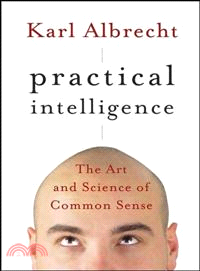Karl Albrecht's bestselling book Social Intelligence showed us how dealing with people and social situations can determine success both at work and in life. Now, in this groundbreaking book Practical Intelligence, Albrecht takes the next step and explains how practical intelligence (PI) qualifies as one of the key life skills and offers a conceptual structure for defining and describing common sense.
Throughout Practical Intelligence, Albrecht explains that people with practical intelligence can employ language skills, make better decisions, think in terms of options and possibilities, embrace ambiguity and complexity, articulate problems clearly and work through to solutions, have original ideas, and influence the ideas of others. Albrecht shows that everyone's PI skills can be improved with proper education and training and challenges all of us--from parents and teachers to executives and managers--to upgrade our own skills and help others develop their own PI abilities.












